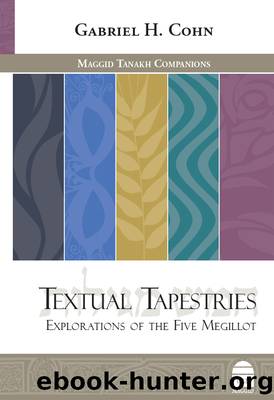Textual Tapestries – Explorations of the Five Megillot by Gabriel H. Cohn

Author:Gabriel H. Cohn
Language: eng
Format: epub
Publisher: Maggid Books
Chapter Twenty
The Literary Character of the Book
The five dirges in Lamentations have – in addition to the alphabetical acrostics – various common linguistic and stylistic features, which help us to appreciate the uniqueness of the book.
METER
The first four chapters of the book are written in part in elegy meter; each line is actually a double line: a longer line followed by a shorter one. The longer line usually contains three accented syllables, and the shorter line two. Only in the fifth chapter are most verses divided into two equal parts.1
Behold, O Lord; for I am in distress;
my bowels are troubled;
My heart is turned within me;
for I have grievously rebelled;
Abroad the sword bereaves,
at home it is like death. (1:20)
They sit upon the ground, and keep silence,
the elders of the daughter of Zion;
They have cast up dust upon their head;
they have girded themselves with sackcloth.
The virgins of Jerusalem
hang down their heads to the ground. (2:10)
My soul is far removed from peace;
I have forgotten prosperity.
And I said, My strength and my hope
are perished from the Lord.
Remember my affliction and my misery,
the wormwood and the gall. (3:17–19)
Her nazirites were purer than snow,
they were whiter than milk,
They were more ruddy in body than rubies,
their polishing was as of sapphire. (4:7)
Our inheritance is turned over to strangers,
our houses to aliens.
We are become orphans and fatherless,
our mothers are like widows. (5:2–3)
THE SPEAKER
Common to the various laments is the transition, in the middle of the chapter, from one point of view to another, from the third person to the first person or vice versa, and in the last chapter, from description to prayer.
In the first chapter, the author initially refers to Zion in the third person (1–11, except for the end of v. 9), whereas in the second half of the chapter, Zion herself speaks in the first person (12–22, except for v. 17).
In the opening of the second chapter, the author once again speaks in the third person, making reference to the daughter of Zion, Jacob, Israel, and the daughter of Judah (1–10). Later, the lamenter speaks in the first person (11–19), and then once again Zion speaks in the first person (20–22).
In the third chapter, the lamenter bemoans his fate using both the first person (1–24) and the third person (25–29), until he connects his personal fate to that of his people, saying in the first person plural: “Let us search and try our ways” (40–47). He then expresses pain in the first person for the suffering of his people and for his own suffering (48–66).
In the middle of the fourth chapter, the lamenter shifts from the third person singular to the first person plural (17–20).
The fifth lament, which the author formulates in the first person plural, opens and closes with words directed at God (1; 19–22).
These transitions from the third person to the first person, the inclusion of those present in the recitation of the dirge, and the direct addresses to God or to the nations in the middle or at the end of the chapter all highlight a suffering so great that it bursts out in all directions.
Download
This site does not store any files on its server. We only index and link to content provided by other sites. Please contact the content providers to delete copyright contents if any and email us, we'll remove relevant links or contents immediately.
It's Never Too Late by Kathie Lee Gifford(627)
The 9.9 Percent by Matthew Stewart(595)
Hebrews, James by George H. Guthrie & George H. Guthrie(582)
Take Back Your Time by Christy Wright(581)
Israel: Ancient Kingdom or Late Invention? by Daniel I. Block(556)
The New Oxford Annotated Bible with Apocrypha by unknow(552)
The Book Every Leader Needs to Read by 48 Authors(550)
Eating the Bible by Rena Rossner(539)
Insights on Hebrews by Charles R. Swindoll(535)
Psalms, Proverbs, Ecclesiastes, and Song of Songs by John W. Hilber & Tremper Longman III & Duane Garrett(511)
The Jew in the Lotus by Rodger Kamenetz(473)
Commentary on the Torah by Richard Elliott Friedman(468)
Judges: Volume Two by unknow(465)
Who Wrote the Bible? by Richard Elliott Friedman(458)
NKJV, Ignite, eBook by Thomas Nelson(439)
Commentary on James (Commentary on the New Testament Book #16) by Robert H. Gundry(435)
Proverbs, Ecclesiastes, Song of Solomon (Ancient Christian Commentary on Scripture) by J. Robert Wright(431)
Job, Ecclesiastes, Song of Songs by August H. Konkel & Tremper Longman III(427)
Reading the Bible with Rabbi Jesus by Tverberg Lois(409)
